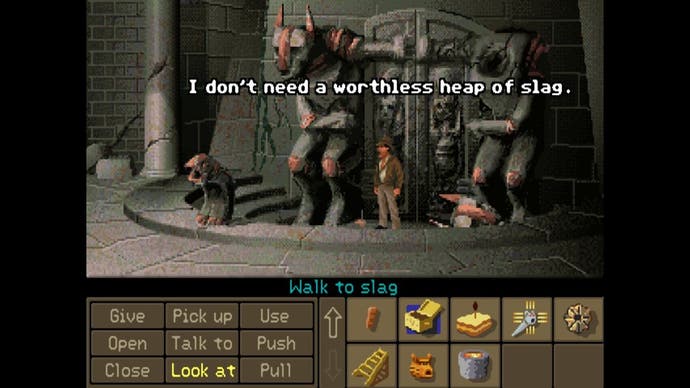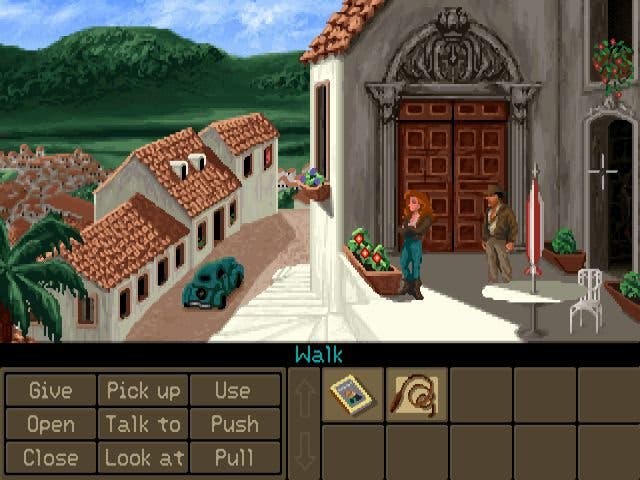Retrospective: Indiana Jones and the Fate of Atlantis
The retro path.
These retrospectives are rapidly becoming confessionals for me. Here's this week's: I don't much care for Indiana Jones.
If I ever saw the films as a kid, they washed right over me. As an adult, I find them mostly quite boring. I went out and bought the DVD box set many years back, convinced I'd want such things in my life. But they're not adventurous enough to be adventure movies and not fantastical enough to be fantasy movies. The middleground in which they exist is clearly ideal for the vast majority, but somehow not for me. Once again, I miss out.
However, like wrapping a pill up in tuna so your cat will eat it, putting Dr Jones inside a LucasArts adventure game is the surest way to make me forget my hesitation and happily open wide. (My mouth, you weirdo.)
What's more helpful is making it one of the finest adventure games the studio ever made. Fate of Atlantis really is outstanding, and even more so for being one of very few nineties adventures that hasn't become too infuriating for modern play.
Nazi business

It's a good job the Nazis didn't have access to all the mystical, powerful idols and machinery that gaming would have us believe. Although it's equally odd that our fiction wants to take one of the most horrific and murderous forces ever to have existed, and suggest that had they only got their hands on the Holy Grail or secrets of ancient worlds then they could have caused some real trouble. But such is the way of both gaming and the Indiana Jones franchise, and so once more the good doctor is trekking about the planet trying to beat the Nazis to finding the lost city of Atlantis.
He teams up with Sophia Hapgood, a surrogate Marion Ravenwood, with whom he also had a brief affair in the past, and again with whom he must work in order to succeed. Hapgood was formerly a successful archaeologist, but quit in order to become a psychic, aided by her spirit guide, Atlantean god Nur-Ab-Sal - something that disgusts the rationalist Indy. Together they chase down three stone discs that are said to allow access to the sunken city, visiting Iceland, Tikal, the Azores, New York, Crete...
Construction for the Modern Idiot
But before any of that, there's one of the most splendid introduction sequences of any game. You begin controlling Indy with only the mouse cursor, the rest of the SCUMM verb system blanked out at this point. Your attempts to locate a statue see him having a series of clumsy accidents, as he crashes through floor after floor, before the game's intro proper.

There's a strong whiff of precognitive satire as you play, using an interaction system that's pretty much how modern adventures play now - one cursor, no choice about how its used - and how clumsy this makes Indy. But it's the way this sequence is then later reversed - as you must make your way back to the top of the building - that demonstrates quite what splendid structural thinking is going on here.
In fact, the whole game is remarkably well constructed. It never makes you feel restricted to one path, one direction, while also managing to never generate that constant failure of adventures, agoraphobia from too many places to go at once.
Skipping between countries, finding items in one to use in another, constructing solutions - it's all splendid fun. And then it whisks you on to the next set, the next collection of choices. And for once they're really choices.
Fate of Atlantis is well known for having three different routes to completion. After the first act you can choose to play the Wits, Team or Combat path. The first is packed with tough puzzles, the second means Sophia accompanies you throughout and you often rely on each other to progress, and the third lets Indy use the game's primitive fisticuffs to punch his way out of trouble. Then all three paths lead to the same point for the game's final act, which offers at least a couple of alternative endings.
But there's choice between as well. In two forms. Some puzzles have multiple solutions, and others change each time you play the game. In fact, a lot does.








